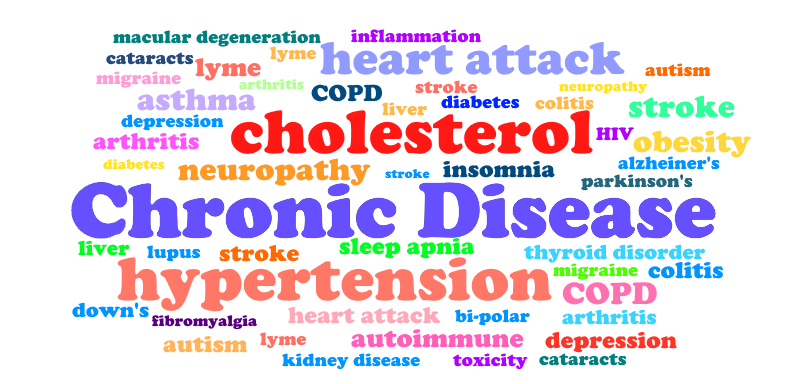- Diseases Associated With Low Glutathione https://www.dropbox.com/s/j456yf74ubkmi6q/Diseases%20Associated%20with%20Low%20Glutathione.pdf?dl=0
- Aging – Diseases of aging are related to decreasing Glutathione levels. https://www.ncbi.nlm.nih.gov/pubmed/3443453
- Alzheimer’s Disease – Alzheimer’s is a neurodegenerative disease that causes memory loss, disorientation, behavioral issues and more. Glutathione may play a key role in Alzheimer’s Disease. https://www.ncbi.nlm.nih.gov/pubmed/24496077. See also Brain Disorders
- Asthma – Asthma is an inflammatory disease of the airways inside the lungs, resulting in shortness of breath wheezing and more. High Oxidative Stress and low Glutathione are symptoms of Asthma. https://www.ncbi.nlm.nih.gov/pmc/articles/PMC3353819/
- Autism – Autism is a neurodevelopmental disorder that manifest to varying degree in difficulty with social interaction. Individual cases vary considerably, from nearly undetectable to a total inability to interact. Autism has been strongly linked to high Oxidative Stress and low Glutathione in the brain. https://www.ncbi.nlm.nih.gov/pubmed/22781167. See also Brain Disorders
- Bipolar Disorder – Bipolar Disorder (previously known as Manic Depression manifests in extreme mood swings from depression (sadness, crying, lethargy) to mania (euphoria, irritability, high energy) See Brain Disorders
- Brain Disorders – Bipolar disorder, Autism, Alzheimer’s, Parkinson’s and Schizophrenia, have all been linked to low Glutathione levels and oxidative stress in the brain and in the blood. https://www.ncbi.nlm.nih.gov/pubmed/25405315
- COPD – COPD or Chronic Obstructive Pulmonary Disease is manifesting in breathing problems and poor airflow. High Oxidative Stress and low Glutathione are known to be factors for COPD. https://www.ncbi.nlm.nih.gov/pubmed/20648694
- Crohn’s Colitis – Chron’s is a form of Inflammatory Bowel Disease and Colitis is specific to the Colon. Free radicals abound and Glutathione is markedly low in the mucosa of Crohn’s sufferers. https://www.ncbi.nlm.nih.gov/pmc/articles/PMC1991291/ https://www.ncbi.nlm.nih.gov/pubmed/10601540
- Depression – Depression manifests poor mood, lethargy, a sense of desperation and more. Low Glutathione and high Oxidative Stress may play a role in Depression. https://www.ncbi.nlm.nih.gov/pubmed/29078101
- Diabetes I – Diabetes I sufferers do not produce enough insulin and is an autoimmune disease. It affects many bodily functions.Studies suggest that raising Glutathione can impact some aspect of Diabetes I. https://www.ncbi.nlm.nih.gov/pubmed/25406277
- Diabetes II – Diabetes II symptoms are very similar to Diabetes I but it is not an autoimmune disease but is rather caused usually by dietary and lifestyle choices. There may be a genetic predisposition. A study by the American Diabetes Association suggest that raising Glutathione through supplementing with the precursors (the raw materials, not Glutathione directly) will be of benefit. https://www.ncbi.nlm.nih.gov/pmc/articles/PMC3005481/
- Down’s Syndrome – Down’s Syndrome is a genetic disorder that is caused by a 3rd partial or complete copy of chromosome 21. Down’s manifests in typical facial features and varying degrees of intellectual issues. A symptom of this disease a difficulty manufacturing glutathione. https://www.ncbi.nlm.nih.gov/pubmed/12756395
- Eye Diseases – Glaucoma, Cataracts and Macular Degeneration are all associated with aging and there is a growing body of evidence that the decreasing production of Glutathione as we age allows Oxidative Stress which may be a contributing factor. https://www.ncbi.nlm.nih.gov/pmc/articles/PMC3081196/ https://www.ncbi.nlm.nih.gov/pmc/articles/PMC5131953/
- Fibromyalgia – Fibromyalgia is linked to high inflammation due to Oxidative Stress, resulting in “pain everywhere” and excessive fatigue. One of Glutathione’s primary roles is to repair Oxidative Stress. https://www.ncbi.nlm.nih.gov/pubmed/26177214
- Kidney Disease – Glutathione may be a therapeutic treatment for Chronic Kidney Disease. https://academic.oup.com/ndt/article/19/8/1951/1918231
- Liver Disease – Glutathione may also be a therapeutic treatment for Alcoholic and Non-alcoholic Liver Disease. https://www.ncbi.nlm.nih.gov/pubmed/27603810
- Lupus – Lupus is an autoimmune disease that causes the body’s immune sysem to attack various healthy parts. Low Glutathione has been linked to Lupus. https://www.researchgate.net/publication/276421004_Glutathione_A_possible_link_to_autophagy_in_systemic_lupus_erythematosus https://www.ncbi.nlm.nih.gov/pubmed/3443453
- Parkinson’s Disease – Parkinson’s Disease is a long term degenerative disorder in which motor function gradually deteriorates. Typical symptoms are shaking, slowness and rigidity. See Brain Disorders
- Rheumatoid Arthritis – Rheumatoid Arthritis is an autoimmune disease affecting mainly the joints but can result in inflammation around the heart and/or lungs. It has been linked to decreasing levels of Glutathione. https://www.ncbi.nlm.nih.gov/pubmed/3443453
- Stroke – Strokes result from poor blood flow to the brain causing cell death. This poor blood can have many causes. Brain cell death results in physical restrictions or death. Glutathione may reduce cell damage in Stroke sufferers. https://www.ncbi.nlm.nih.gov/pubmed/25722793
(647) 286-0285
ian@Live2theMAX.com

